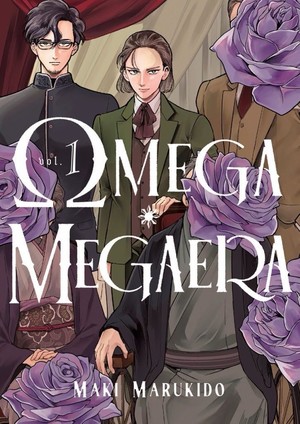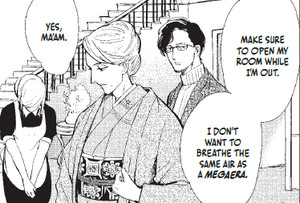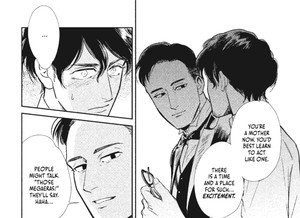The Fall 2025 Manga Guide
Omega Megaera
What's It About?

In a world where people have one of three sexes--alpha, beta, or omega--in addition to being male or female, alphas have pushed their way to the top. Omegas are oppressed, their status determined by whether or not they successfully bear alpha children. An omega named Saimon marries into the prolific Hanabusa family, a major conglomerate, but is unable to produce an heir for his alpha husband Seijuro, and is shunned as a “Megaera,” a creature that brings ill fortune. One day, Saimon is summoned by the family patriarch Zenjiro and ordered to locate the man's illegitimate son. Saimon finds the boy, Mamiya, who has been making a life for himself on the streets while hiding the fact that he's an omega. Desperate to regain his position as Seijuro's top spouse, Saimon proposes an audacious plan: pass Mamiya off as an alpha heir and try to gain the headship of the Hanabusa family.
Omega Megaera is written and drawn by Maki Marukido. English translation by Kevin Steinbach. Lettered by Madeleine Jose. Published by Kodansha (November 25, 2025). Rated OT.
Is It Worth Reading?
Rebecca Silverman
Rating:

In some ways, Omega Megaera is written to be omegaverse for people who don't care for the genre. It's not about the romance tropes inherent in the genre; it's barely even about male pregnancy. Instead, it's a story that tries to dig deep into gender-based discrimination, using the six genders of the omegaverse to broaden (and at the same time narrow) the scope of who gets treated poorly. Much like at dark points in real history, those who can bear children are only valued for their uteruses, with the only real change being that both men and women fit this bill.
In Maki Marukido's version of the world, only omegas can bear alpha children. Since alphas are prized above all else, that means that omegas are branded at birth, collared at puberty, and forced into polygamous marriages with the stated intent of breeding more alphas. Often, they're as young as fifteen; one side character in the book was raped at thirteen with her parents' consent. Omegas aren't supposed to go to university or have jobs – they're treated only as baby machines by the alphas of society. (Betas don't get much time in this volume, but the way that the other two sets ignore them leads to some interesting possibilities for espionage and change.) The only exception is if an omega fails in their “duty” and doesn't produce a child. Then they're rebranded as “megaeras” and regarded as bad luck.
It's a telling term – in Greek mythology, Megaera (not to be confused with Megara) is one of the furies, a goddess of jealousy. The use of her name for childfree omegas speaks of an assumption that all omegas want to have children and will be horribly jealous of those who can if they're infertile. Shockingly enough, this is a strictly alpha (and maybe beta) worldview; omegas themselves are just prey to the assumptions made about them. Kayo, the niece of Saimon, one of the protagonists, desperately wants to go to college, but her parents discount that, moving ahead with an arranged marriage for her even though she actively dreads it and has no desire to have children. If this doesn't sound familiar, you haven't been reading your Margaret Atwood or paying attention to history.
The plot of this volume revolves around Saimon and Mamiya, the offspring of the aforementioned rape. They're both omegas, and Saimon came of age in a more tolerant time, which has since gone backward with a change of government. That means he's a trained scientist, although currently his Megaera status has overwhelmed that. He promises to pass Mamiya off as an alpha using a drug he created to help him avoid the life of an omega, and while the story doesn't go much beyond that in this volume, it's got potential.
I'm not particularly invested in the characters' relationships with each other at this point, but the world fascinates me. It's a new form for an old tale, and I'd sooner recommend it to readers looking for social commentary on gender than omegaverse readers. This could say a lot of things that always bear repeating about how society treats those who can bear children.
Bolts
Rating:

I have read a good amount of omegaverse literature at this point in my life, and this might be the first story that really digs into the potentially screwed up nature of a society that is run by these different sex values. We live in an age where people are categorized under the assumption that there are just two sexes. Imagine if there were six and they all revolved around the idea of having children? This is a refreshing change of pace from other omegaverse stories that I've read, where this would feel more like a footnote or as an excuse to generate same sex romance/pregnancy stories. There's nothing wrong with that. I was just taken off guard by how heavy the subject matter is here. We have a main character who, at one point in their life, was driven to the point of suicide because they are a special class of person who is unable to deliver a child and is therefore seen as worthless in the eyes of society. There are a lot of heavy things here, like children being conceived under questionable circumstances, interpersonal family drama regarding different titles of succession, and genuine tension when it comes to trying to define yourself as your own person.
I was genuinely fascinated when characters started making their intentions known and how it related to their sex classification. Most of them tried to operate in defiance of it, while others feel like they are too defined by it. The book never gets preachy, as every action comes from a character's motivation, but it's clear that there is a lot of damage that has been done throughout a history of relying on this type of sex system. In a lot of ways, it's depressing, but I can't stop finding it genuinely interesting. It's also surprising that all of this was done in a story that doesn't really show sex in the book. Most of the active sex itself is either talked about or implied through dialogue, but this is not a story that you read for titillation. This is a story that uses sex as a means of talking about people who feel as if they have been wronged or entitled to things based on their status within a family. It might be a bit heavy to fully digest, but if you can, then I think you would be genuinely in for a surprise.
discuss this in the forum (22 posts) |
back to The Fall 2025 Manga Guide
Seasonal homepage / archives